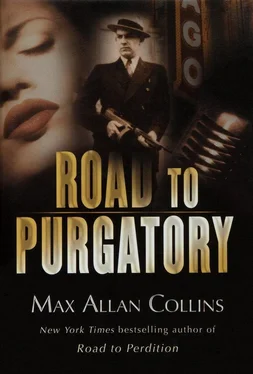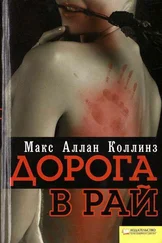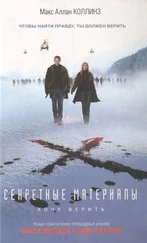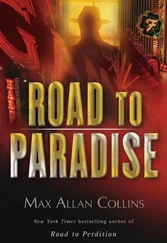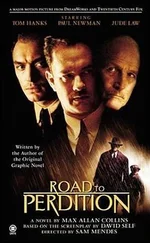As imposing as this rotunda had been, the federal facilities themselves proved to be a utilitarian cluster of offices, hearing rooms, and conference chambers. Michael checked the slip of paper on which he’d written his captain’s instructions, found the corresponding number on pebbled glass, and knocked.
“Come in!” a mellow male voice called.
Beyond the door, Michael found himself in a small one-room office facing a scarred wooden desk, behind which a man of perhaps forty sat in a swivel chair that was the cubbyhole’s most lavish touch. Filing cabinets hugged the left wall, and stacks of white cardboard boxes did the same at the right, stopping at a window whose whirring fan was aided by an afternoon that was fairly cool to begin with.
In one corner, right of the door, stood a hat tree on which a trenchcoat, dark gray fedora, and lighter gray suitcoat were neatly hung; in the other corner, a water cooler burbled. A single wooden chair faced the desk, waiting for Michael.
It was as if the young soldier had entered the office of the guidance counselor at DeKalb Township High.
A six-footer with alert gray eyes and a ready smile, Michael’s host — in a white short-sleeve shirt with a copper-colored tie — rose and extended across the desk a hand, which Michael shook, the grip firm but not overdoing it. The man’s boyishly handsome face — spade-shaped, faintly freckled — seemed just a trifle puffy. Overwork, Michael wondered, or maybe this was a drinking man?
Possibly both.
Michael had noticed this quietly affable fellow on the periphery of the events in Chicago a few days ago, when the mayor and various politicians and dignitaries had been making their Medal of Honor fuss in front of public and press. Just another vaguely official presence in a fedora and crisp suit and tie, the man had spoken in an intimate, whispering way with both Captain McRae and Governor Green.
Michael had picked up on this, but so much had been going on, it hadn’t really registered; the man had seemed familiar, but this was a fairly typical government sort, almost nondescript...
Now, close up, Michael had a sudden jolt of recognition, though he hoped it didn’t show.
“Please sit, Sergeant,” Eliot Ness said.
Michael Satariano had been named Michael O’Sullivan, Jr., the last time — the other times — he had seen Eliot Ness. And Michael had only been eleven years old.
The first instance had been in Chippiannock Cemetery, in Rock Island, Illinois, in the winter of 1931. Michael’s mother, Annie O’Sullivan, and his brother, Peter, were buried there. Michael’s father had gone to the cemetery, not only to visit the graves, but for a meeting with Ness, a federal agent working to take down Chicago gangster Al Capone.
Michael’s father had arranged the parley to turn over to the G-man key evidence against a crony of Capone’s — the patriarch of the Irish Tri-Cities mob, John Looney.
For a dozen years, Michael’s real father — Michael O’Sullivan, Sr. — had been the trusted right hand of Looney, who since the turn of the century ruled the Iowa/Illinois Tri-Cities. A hero in the Great War, the pride of the Irish immigrants of Rock Island, Michael’s father became like a son to Mr. Looney.
Unfortunately, Mr. Looney already had a son — Connor, or as some called him, “Crazy” Connor... having “Looney” as a last name apparently not sufficiently conveying the man’s homicidal hotheadedness. It was said Connor Looney resented O’Sullivan getting all the really important jobs, as if Old Man Looney were grooming the lieutenant for a greatness Connor considered his birthright.
When the O’Sullivan family had gone to the Looney mansion at Christmas, just before everything bad happened, the affection the old boy had for Michael’s father had been apparent. Looney and O’Sullivan had sung together, arms around each other’s shoulders, while Connor, lurking unhappily on the fringes, looked on.
And the O’Sullivans had benefited from the Looney association, no question. Next to Looney’s mansion itself, they had the nicest home in town, and the O’Sullivans owed their very good life in those very hard times to the patriarch.
Nonetheless, Michael’s father had kept Michael and his younger brother Peter — and their mother — as far away as possible from what the head of the house did for a living. O’Sullivan made it clear that certain questions were not to be asked, and that Mr. Looney’s munificence was to be respected and valued.
Michael and Peter would talk deep into the night, wondering what their papa did for Mr. Looney, exactly — and why Papa carried a gun — until, on a kind of dare, a few days after Christmas, young Michael stowed away in the backseat of Papa’s car, to spy on him, and see what kind of “missions” Papa was going on...
What Michael saw was his father and Connor Looney round up some men into a warehouse. Papa had a tommy gun (that’s what they called it in the movies, anyway), and it was like he and Connor were arresting the men. Curious, the lad had gone to a window of the warehouse to watch, despite a driving rain. He saw Connor Looney arguing with a man, and when the argument got nasty, Connor just... just... shot the man.
Murdered him!
The other men used the moment of confusion to go for their own guns, and Michael had witnessed his father emptying the machine gun, killing them all, empty shells raining down harder than the rain itself, and then Connor Looney caught a glimpse of young Michael in the window glass, peeking...
But Michael did not run.
He felt strangely guilty, whether for what he’d done or what his papa had done... after all these years, he still couldn’t say. And so, sitting in the pouring rain, like a naughty kid banished to a corner, he promised both his father and Mr. Looney’s son that he would never tell anybody anything about what he saw... and Connor Looney seemed to accept that.
A few days later, Mr. Looney sent Michael’s father on an “errand,” only the message O’Sullivan was delivering to another Looney associate named Lococo turned out to be O’Sullivan’s own death warrant. Not for nothing, though, had Michael O’Sullivan, Sr., earned the sobriquet “The Angel of Death”: the trap failed, Lococo and several of his underlings dying in the attempt.
While Michael’s father was supposed to be getting himself killed — and while Fate or perhaps God had seen to it that Michael was not home, rather at a church party — Connor Looney came to the O’Sullivan house and shot Michael’s mother, cold-bloodedly murdering her, then (mistaking Peter for the older boy) killing Michael’s brother, too.
Both O’Sullivan and Michael got home too late to do anything but grieve. They paid their respects to Mama and Peter, gathered their things, and slipped into the night. They would flee the Tri-Cities, but first O’Sullivan went looking for Connor and Mr. Looney, though all he found was a lot of Mr. Looney’s other soldiers and a lawyer who tried to make a deal. So O’Sullivan, Sr., declared war, leaving a trail of dead gangsters behind. And one dead lawyer.
That night they drove to Chicago; O’Sullivan had done work there for the top gangsters, who had an alliance with Mr. Looney. Michael’s papa talked to Frank Nitti (who was second only to Al Capone himself), pleading his case, asking that the Chicago people stay out of this personal matter, and offering to come work for them, when it was done.
When Nitti didn’t accept the offer, O’Sullivan declared war on Chicago as well, leaving a trail of dead Capone thugs throughout their Lexington Hotel headquarters.
It had been O’Sullivan’s intention to take his surviving son to the farm of an uncle and aunt outside Perdition, Kansas, for safekeeping; but with both the Looney and Capone forces after them, that became too dangerous, and father and son remained on the road. Eventually, at Chippiannock Cemetery, O’Sullivan was able to turn that key evidence over to Eliot Ness, which led to Looney’s arrest.
Читать дальше
